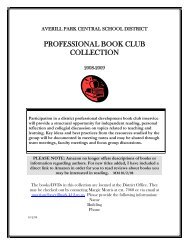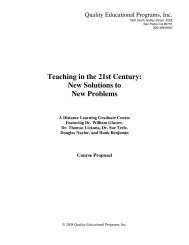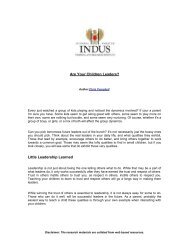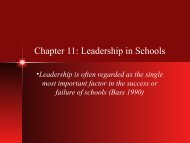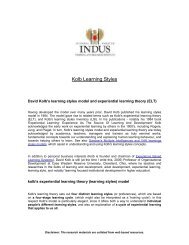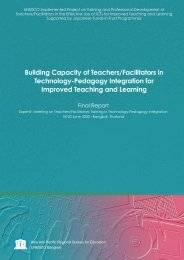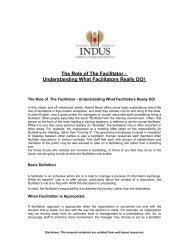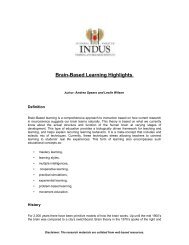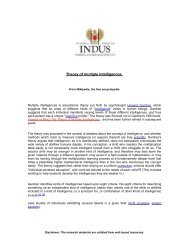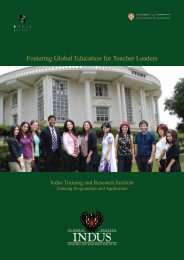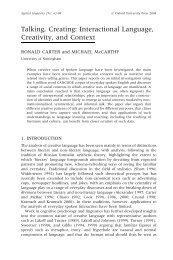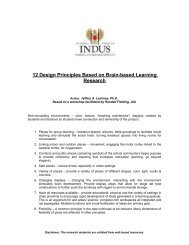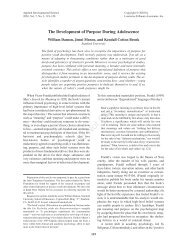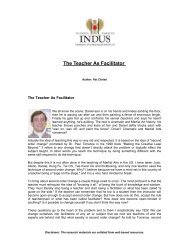Primary Years Programme Making the PYP happen - ITARI
Primary Years Programme Making the PYP happen - ITARI
Primary Years Programme Making the PYP happen - ITARI
- No tags were found...
You also want an ePaper? Increase the reach of your titles
YUMPU automatically turns print PDFs into web optimized ePapers that Google loves.
<strong>Making</strong> <strong>the</strong> <strong>PYP</strong> <strong>happen</strong><br />
What are <strong>the</strong> purposes of assessment<br />
The purposes of assessment are to promote student learning, to provide information about student learning<br />
and to contribute to <strong>the</strong> evaluation of <strong>the</strong> effectiveness of <strong>the</strong> programme.<br />
Student learning is promoted through:<br />
! assessing <strong>the</strong> students’ prior knowledge and experience brought to <strong>the</strong> topic or task in order to<br />
plan and/or refine <strong>the</strong> teaching and learning programme or to meet individual or group needs<br />
! building a profile of students’ understanding<br />
! engaging students in reflection on <strong>the</strong>ir learning and in assessment of <strong>the</strong> work produced by<br />
<strong>the</strong>mselves and by o<strong>the</strong>rs.<br />
Information about student learning is provided by:<br />
! representative examples of students’ work or performance<br />
! compiling statistics based on explicit benchmarks and rubrics<br />
! records of test results.<br />
<strong>Programme</strong> evaluation uses a variety of student assessments to:<br />
! assess student performance in relation to <strong>the</strong> general and specific outcomes of <strong>the</strong> programme<br />
! assess group performance in relation to o<strong>the</strong>r classes or groups both internally and externally<br />
! inform o<strong>the</strong>rs, including students, colleagues and parents.<br />
What is good assessment practice<br />
Effective assessments:<br />
! are planned for and built in, not bolted on<br />
! identify what is worth knowing and assess it<br />
! have criteria that are known and understood in advance<br />
! allow students to demonstrate <strong>the</strong> range of <strong>the</strong>ir conceptual understandings, <strong>the</strong>ir knowledge and<br />
<strong>the</strong>ir skills<br />
! are made up of tasks that require <strong>the</strong> syn<strong>the</strong>sis and application of <strong>the</strong>ir learning<br />
! focus on big ideas and transdisciplinary skills ra<strong>the</strong>r than facts or specialized skills<br />
! are based on real-life experiences and can lead to o<strong>the</strong>r problems or questions<br />
! focus on producing a quality product or performance<br />
! highlight a student’s strength and expertise ra<strong>the</strong>r than what <strong>the</strong> student does not know<br />
! include collaboration between <strong>the</strong> student and <strong>the</strong> teacher or among students<br />
! employ many ways for a student to demonstrate expertise<br />
! take into account different ways of learning and knowing and are sensitive to personal circumstances<br />
! allow students to express different points of view and interpretation<br />
! promote self-evaluation and peer-evaluation<br />
! use scoring that focuses on <strong>the</strong> essence of <strong>the</strong> task and not on what is easiest to score<br />
88 © IBO 2000



